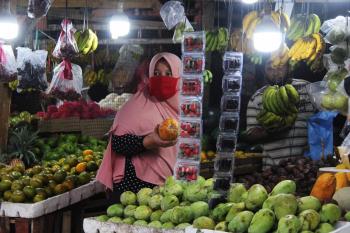Indonesia records 20-year low inflation around Idul Fitri as pandemic upends purchasing power

Indonesia booked record low inflation in May leading up to Idul Fitri as the COVID-19 outbreak upended demand and reined in consumer spending, Statistics Indonesia (BPS) announced Tuesday.
The consumer price index (CPI) stood at 0.07 percent in May, the lowest in 20 years and lower than the 0.55 percent recorded in June last year, when Idul Fitri was celebrated. The annual inflation rate was recorded at 2.19 percent, much lower than the 3.32 percent in May last year and the 3.28 percent in June last year.
Meanwhile, core inflation stood at 0.06 percent in May, bringing the annual rate to 2.65 percent, while administered prices saw inflation of 0.67 percent. Volatile food prices saw deflation of 0.5 percent.
“The uncertainty surrounding the economy has made the inflation level very unusual and much lower than in previous years, as demand usually spikes during the Idul Fitri holiday,” BPS head Suhariyanto said in a livestreamed news conference. “We need to work on boosting people’s purchasing power.”
May’s figure marks the lowest Idul Fitri inflation level in the country’s 74 year history, as during the Muslim holiday people usually participate in mudik (exodus), family gatherings and mass shopping sprees that boost demand.
This year, the government banned mudik and several regions nationwide implemented large-scale social restrictions (PSBB) to contain the COVID-19 outbreak, leaving millions of people out of work. The virus had infected at least 26,900 people as of Monday afternoon, according to official data, since the government announced the first two confirmed cases in early March.
BPS data revealed that the highest level of inflation, 0.87 percent, was seen in the transportation sector in May, followed by the health sector with 0.27 percent. However, the food, beverage and tobacco segment saw 0.32 percent deflation, as food prices dropped amid the pandemic.
“The transportation sector recorded the highest inflation driven by rising prices of airline and train tickets, despite the government’s appeals for people not to travel,” Suhariyanto said. “However, it was very low compared to previous years.”
Despite the mudik ban, the government still allows certain officials and individuals to travel after providing certain documents and requires airlines and bus and train operators to limit passenger numbers to 50 percent capacity.
Bank Indonesia (BI) Governor Perry Warjiyo said last week that this month’s inflation level was driven by low consumer demand and weak commodity prices, among other things, adding that inflation would remain within the central bank’s target of 2 to 4 percent this year.
“Several factors caused May’s inflation to be low, such as COVID-19, which has lowered demand for goods, and weakening global commodity prices,” Perry said. “Another factor is that the rupiah exchange rate remained stable, while inflation expectations anchored.”
The rupiah appreciated more than 13 percent from a recent low of Rp 16,575, a level unseen since the 1998 financial crisis, to Rp 14,415 on Tuesday, Bloomberg data show.
“Going forward, inflationary risks throughout 2020 are well balanced between global disinflation on the back of plunging energy prices and potential supply distortions due to measures to withstand COVID-19,” Bank Danamon economist Wisnu Wardana wrote in a research note, adding that the bank forecast this year’s inflation to be 2.85 percent.
“We do not see inflation as a factor that may alter BI's ongoing accommodative stance,” said Wisnu. “Although the low inflation level opens room for BI to lower its benchmark rate, the current priority is to maintain exchange rate stability.”
The central bank decided to leave its benchmark interest rate unchanged at 4.5 percent at a monthly meeting in May as it aimed to safeguard the stability of the financial market while ensuring sufficient liquidity for the country’s banking sector amid the economic impacts of COVID-19.
“While we are watching BI's stance closely, we maintain our view that BI will hold its benchmark rate,” Bank Mandiri economist Andry Asmoro said. “The factors limiting further policy rate cuts are potential risk in the balance of payment in 2020, specifically from the financial account side, which may affect the stability of the rupiah’s exchange rate and the higher fiscal deficit projection of above 6 percent of GDP.”
He projected this year’s inflation to reach 2.69 percent, higher than last year’s 2.59 percent, due to increasing gold prices amid higher uncertainty in the financial market, increased supply of money from the economic stimulus and higher prices of imported food.
